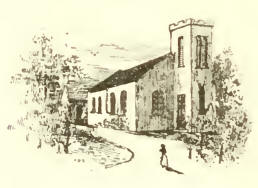|
During the memorable
Disruption year Mr. Thomson of Banchory, and other influential laymen,
aided occasionally by clergymen from Aberdeen, held services in the open
air and farm buildings, in various parts of Cults. Although the parish
minister, Dr. Morison, with his assistant and successor, Dr. Paul, held
fast to the Establishment, a good many parishioners on the north side of
the river threw in their lot with the dissenting party. It being found
necessary to have a Free Church erected in Cults, Mr. Shirra Gibb,
proprietor of the estate, was approached with the view of obtaining a
site, which he granted on reasonable terms. The spot selected was a
piece of waste ground near the centre of the district, and about
three-hundred yards north of the turnpike road. No time was lost over
the construction of the building, and the Church was formally opened for
divine service early in 1844 by the Rev. \V. G. Blaikie, D.D., now
professor of Apologetical Theology in the New College, Edinburgh.
For several years
thereafter probationers discharged the ministerial duties, under the
moderatorship and supervision of the Reverend David F. Arthur of
Banchory-Devenick. Some of these licentiates have since taken prominent
positions, notably Mr. Macpherson, who is now minister of a Scotch
Presbyterian church in Liverpool. As, however, the congregation at Cults
gradually increased, it became imperative that a regular ordained
minister should be appointed to the charge.
The Presbytery of the
bounds readily assented to the change, and the choice of the
congregation fell upon the Reverend William Anderson, whose father was
minister of the parish of Kippen, in Stirlingshire, at the Disruption,
but then resigned his charge, rand joined the Free Church party. Mr.
Anderson received his education at the Edinburgh Academy, and at the
Glasgow University, from the latter of which he went to the New College,
Edinburgh, where he attended the Divinity course. He was ordained at
Cults in the spring of 1861, and, shortly after, a manse (it has since
been enlarged), adjoining the church, was erected for him. He proved a
model clergyman and was highly esteemed by the inhabitants of the
district, irrespective of denomination. After eighteen years of active
duty, and when he expected to be able to overtake the ministerial work
with less strain upon himself, he was unfortunately laid aside through
failing health. Acting on medical advice, and accompanied by his wife,
who was a daughter of the late Mr. George Leslie, shipowner, he
proceeded to Bath, in the hope of regaining his wonted strength. His
illness, however, increased, and he died there on 5th April, 1879. His
remains were brought north and interred in the churchyard adjoining the
Free Church of Banchory-Devenick, where a handsome granite monument has
been erected to his memory. It bears the following inscription:—
In memory of Tiie
Reverend William Anderson,
FOR 18 YEARS MINISTER
of the Free Church, Cults, who died 5th April, 1879,
AGEI) 45 YEARS.
An ABLE MINISTER, A FAITHFUL PASTOR,
AND A GOOD SOLDIER OF THE
Lord Jesus Christ.
Erected
Along with a Tablet in
the Church at Cults By iiis Congregation and friends. The tablet in the
Church, which is of white marble, is thus inscribed:—
In memory of Reverend
William Anderson,
First minister of Cults.
Born 31ST October, 1833.
Ordained i6th April, 1861.
Died 8th April, 1879.
Be thou faithful unto death and
I WILL GIVE TIIEE A CROWN OF LIFE.
—Revelation, ii. 10.
The Reverend Charles
Adamson Salmond, son of Mr. Salmond, an Arbroath manufacturer, was, out
of a number of candidates, elected to the vacant charge. His ordination
took place in the Church, on 21st August, 1879. For several years
previously the Church had been found too small for the requirements of
the district, and as Mr. Salmond was an excellent preacher and organizer
of Church work generally, the congregation continued to increase. He set
himself to the work of enlarging the church and also of providing an
adjoining hall. When these alterations were completed he considered
himself free to close with a call he had received from the congregation
of Free St. Matthew’s, Glasgow. The Presbytery, having heard the
respective pleas of parties, refused to sanction the translation so soon
after ordination; but this judgment was reversed on an appeal to the
Synod. Mr. Salmond was accordingly inducted at Free St. Matthew’s, on
May 12th, 18S1.
The Reverend Robert
William Barbour, son of the late Mr. George Freeland Barbour of Bonskeid,
Perthshire, was unanimously appointed successor, and his ordination took
place at Cults, on 13th October, 1881. Mr. Barbour, who was married to a
daughter of Sir Robert N. Fowler, M.P., ex-lord mayor of London, was
possessed of large means, which enabled him to do many philanthropic
acts. He not only took the keenest possible interest in the
congregation, but the cause of temperance, and the furtherance of the
education of the working people of the district, by evening classes and
otherwise, had his close attention. In 1886, owing to the unsatisfactory
state of his health, he resigned the charge, to the regret of the
inhabitants of Cults, to whom he and his wife had endeared themselves.
The Reverend Hugh
Morrison, of the Irish Presbyterian Church, who held a charge at Cumber,
near Londonderry, was unanimously appointed Mr. Barbour’s successor. His
induction took place at Cults, on 6th July, 1887. Mr. Morrison had a
distinguished college career, and, as a preacher, is eloquent and
earnest. He is very popular with his congregation, now numbering close
on 300 communicants.

|

